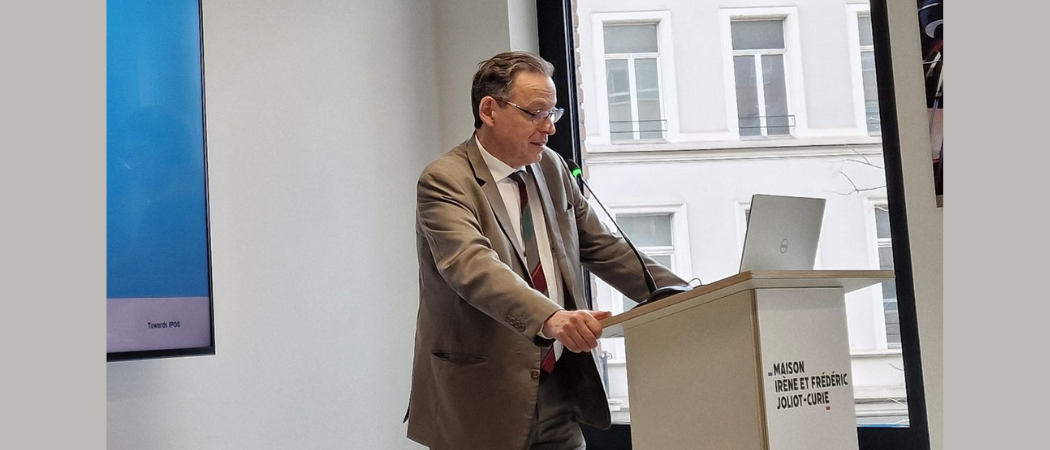Protecting the oceans that cover 70% of the earth is not getting enough attention in climate change policy. Now, scientists are pushing for a dedicated international body to coordinate research and inform policymakers

Alain Schuhl, deputy CEO for Science of the CNRS. Photo: Joachim Claudet / CNRS / Twitter
An international initiative to establish a new body to protect the world’s oceans is taking shape, spearheaded by France’s National Centre for Scientific Research.
Using the Intergovernmental Panel on Climate Change (IPCC) as its role model, the goal is to build a scientific consensus across all disciplines related to sustainability of oceans, creating a body of knowledge that can be used to shape policies to protect, conserve and restore them.
Although IPCC and its sister organisation on biodiversity and ecosystem services (IPBES) cover aspects of how oceans are influenced by climate change, they do not have the reach to tackle ocean sustainability, says Alain Schuhl, deputy CEO for Science of the CNRS. There is a need for a separate and distinct panel.
“If we solve the problem of climate change, there will still be the problem of the oceans which is quite different. IPCC is just looking at one part of the ocean. IPBES is looking at another part. But the ocean is 70% of the surface of the Earth,” he says. There is a clear need for a science-led body to provide policymakers with information on how to protect and preserve the oceans in the future, because there are many competing interests.
“We’re going to put pressure on the ocean in the future,” says Françoise Gaill, lead marine biologist at CNRS, who is spearheading the campaign to establish the International Panel on Ocean Sustainability (IPOS). “It’s not just about fisheries, you also have infrastructure like digital cables going all along the floor of the ocean, you also have sites for different fields of energy like wind energy there. We have to take care of that,” Gaill said.
The proposal for IPOS will be put forward during the United Nations’ Ocean Conference in 2025. Last week in Brussels, a series of research organisations signed a declaration pledging their support.
Seascape
In terms of the structure and set-up of the new organisation, IPOS will not be a carbon copy of IPCC and IPBES.
Tanya Brophie Rudolphe, marine legal expert and research fellow at the Centre for Sustainable Transitions at Stellenbosch University, South Africa, carried out a ‘Seascape’ study of the perceived strengths and weaknesses of IPCC and IPBES amongst the ocean science and policy community, to get a picture of how IPOS should be structured to have maximum effect.
This showed that policymakers find IPCC and IPBES reports too complex, and that politicians often don’t know what to do with them. “The recommendations are often disappointing. They’re global and generic. This is a problem for policymakers, they’re given something that is not actionable,” Brophie Rudolphe says.
“The information and the science provided should be demand-driven. There should be engagement with the audience [the policymakers] so that we’re not wasting our resources, time and money on reports that no one is reading.”
The Seascape report was one of the first steps on the path towards IPOS, and its recommendations will be taken on board to build an effective panel. At the same time, workshops and meetings have been held globally to try to troubleshoot other stumbling blocks that might arise for IPOS.
“We shouldn’t reinvent the wheel,” said Leopoldo Cavaleri Gerhardinger, a marine researcher from Brazil who was involved in a workshop that captured the views of civil society and academia on IPOS. He said there are a lot of funding opportunities for IPOS to tap into. “We should promote resource flows from philanthropic organisations and the United Nations. There’s major potential for us.”
Hans-Otto Pörtner of the Alfred Wegener Institute in Bremerhaven, Germany, who is the co-chair of an IPCC working group that focuses on impact and vulnerability, said speed is essential for success and IPOS should seek to convey the urgency of the situation to mobilise society and policymakers.
“It’s high time to take action. IPOS could become an agent of transformation for ocean users,” Pörtner said. “It should help to strengthen the ocean and channel key ocean information into global literature. What we decide now defines the future of humankind and the planet.”
While oceans need a dedicated panel like IPOS, it is necessary to look for synergies with IPCC and IPBES and avoid “setting up silos” that will duplicate research, said Pörtner.
Barbara Neumann, leader of the Ocean Governance research group at the Research Institute for Sustainability in Potsdam, who is not involved in the proposal being put forward, said it is a very much needed and ambitious project, but more detail is required.
“The ocean crosses all the human-made boundaries that we have, it crosses jurisdictions, and it causes immense challenges for managing human activities. There is a huge divide between natural sciences and social sciences still, and we should have fora where we bring these together,” Neumann said. However these should not replace issues relating to ocean matters in the IPCC and IPBES. “The proposal is very aspirational, but it doesn’t get into the nitty gritty of how it would this work.”





 A unique international forum for public research organisations and companies to connect their external engagement with strategic interests around their R&D system.
A unique international forum for public research organisations and companies to connect their external engagement with strategic interests around their R&D system.